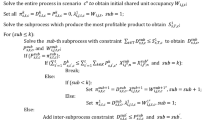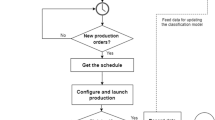Abstract
This paper finds a sequence of m jobs on one processor with the minimum total cost as a solution to the sequencing problem where the raw materials are either expensive to buy or carry. There have been numerous studies considering m jobs on one processor which consider various cost factors such as the total penalty cost. One of the important, but less investigated cost factors, in the previous studies, is the inventory carrying and its relevant capital costs. The inventory costs such as the holding cost and capital cost must be considered in proposing a solution to the sequencing problem. In this paper, by taking those costs into account to address the sequencing problem, a developed slope order index is computed to enable decision makers to a sufficient cost saving sequence of m jobs on one processor. This paper contributes the current knowledge by proposing a new sequencing solution in which some previously less observed costs are considered. The result of this paper can also be employed in scheduling of m jobs where there is a bottleneck and the inventories are expensive or their holding costs are considerable.
Similar content being viewed by others
References
Asadabadi M (2015) A revision on EOQ/JIT indifference points. Int J Ind Eng Comput 6(3):305–314
Asadabadi M (2016) A Revision on Cost Elements of the EOQ Model. Stud Bus Econ 11(1):5–14
Bilgen B, Çelebi Y (2013) Integrated production scheduling and distribution planning in dairy supply chain by hybrid modelling. Ann Oper Res 211(1):55–82
Boysen N, Fliedner M, Scholl A (2008) Sequencing mixed-model assembly lines to minimize part inventory cost. OR Spectr 30(3):611–633
Campbell HG, Dudek RA, Smith ML (1970) A heuristic algorithm for the n job, m machine sequencing problem. Manag Sci 16(10):B-630
Coffman JEG, Garey MR, Johnson DS (1978) An application of bin-packing to multiprocessor scheduling. SIAM J Comput 7(1):1–17
Eastman WL, Even S, Isaacs IM (1964) Bounds for the optimal scheduling of n jobs on m processors. Manag Sci (Pre-1986) 11(2):268
Elmaghraby SE (1978) The economic lot scheduling problem (elsp): review and extensions. Manag Sci (Pre-1986) 24(6):587
Elvikis D, T’kindt V, (2014) Two-agent scheduling on uniform parallel machines with min-max criteria. Ann Oper Res 213(1):79–94
Fliedner M, Boysen N, Scholl A (2011) On the part inventory model sequencing problem: complexity and beam search heuristic. J Sched 14(1):17–25
Gapp W, Mankekar PS, Mitten LG (1965) Sequencing operations to minimize in-process inventory costs. Manag Sci 11(3):476
Györgyi P, Kis T (2014) Approximation schemes for single machine scheduling with non-renewable resource constraints. J Sched 17(2):135–144
Hazir Ö, Kedad-sidhoum S (2014) Batch sizing and just-in-time scheduling with common due date. Ann Oper Res 213(1):187–202
Heath SK, Bard JF, Morrice DJ (2013) A GRASP for simultaneously assigning and sequencing product families on flexible assembly lines. Ann Oper Res 203(1):295–323
Kämpf M, Köchel P (2006) Simulation-based sequencing and lot size optimisation for a production-and-inventory system with multiple items. Int J Prod Econ 104(1):191–200
McNaughton R (1959) Scheduling with deadlines and loss functions. Manag Sci 6(1):1–12
Mor B, Mosheiov G (2014) Polynomial time solutions for scheduling problems on a proportionate flowshop with two competing agents. J Oper Res Soc 65(1):151–157
Pacheco J, Ángel-bello F, Álvarez A (2013) A multi-start tabu search method for a single-machine scheduling problem with periodic maintenance and sequence-dependent set-up times. J Sched 16(6):661–673
Sarin SC, Sherali HD, Liao L (2014) Minimizing conditional-value-at-risk for stochastic scheduling problems. J Sched 17(1):5–15
Shabtay D, Steiner G (2007) Single machine batch scheduling to minimize total completion time and resource consumption costs. J Sched 10(4–5):255–261
Shen L, Mönch L, Buscher U (2013) An iterative approach for the serial batching problem with parallel machines and job families. Ann Oper Res 206(1):425–448
Vaughan TS (2007) Cyclical schedules vs. dynamic sequencing: replenishment dynamics and inventory efficiency. Int J Prod Econ 107:518–527
Author information
Authors and Affiliations
Corresponding author
Rights and permissions
About this article
Cite this article
Asadabadi, M.R. A developed slope order index (SOI) for bottlenecks in projects and production lines. Comput Manag Sci 14, 281–291 (2017). https://doi.org/10.1007/s10287-017-0276-7
Received:
Accepted:
Published:
Issue Date:
DOI: https://doi.org/10.1007/s10287-017-0276-7




